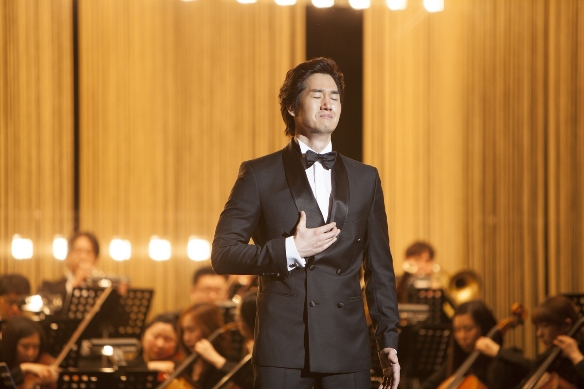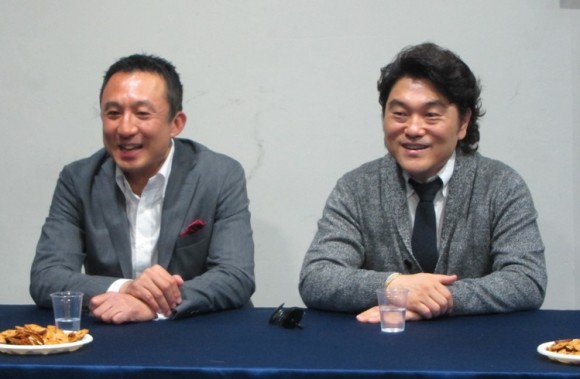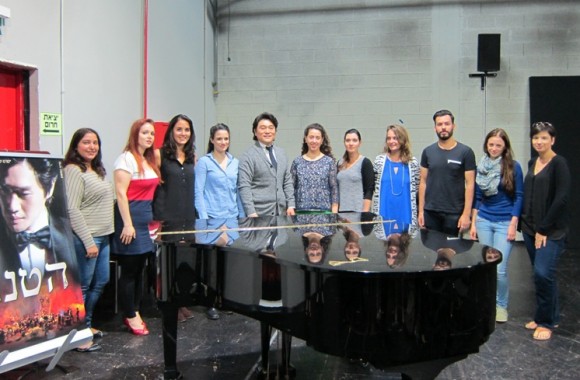The most famous film about the life of a tenor is The Great Caruso, featuring Mario Lanza. That film opens with the title character as a boy, living in poverty, losing his mother, and finding comfort in singing. The Tenor, opening Korean Film Week at the Tel Aviv Cinematheque, follows a very different narrative. A biopic about an opera singer who loses his voice to illness just at the peak of his career, written and directed by Sang Man Kim and starring Yu Ji-tae, the film is based on the true story of tenor Bae Jae-chul.

The Tenor opens with success: the camera takes us inwards from the steps of the opera house and the people gathering within, to the backstage halls where the journalists are hounding the production staff, and finally to the tenor himself, preparing for his entrance. He’s young but he is already tasting the grand success that comes with exceptional talent, extraordinary voice and polished technique. Everything hangs upon that voice. Then, at the peak of his career, everything changes.
The premise of The Tenor may sound simple: a rising singer tragically loses his ability to sing and overcomes the odds to get back to the stage. However, the characters of the film make it so powerful: Jae-chul’s loyal and supportive wife, Yoon-hee (Cha Ye-ryeon), and his Japanese manager, Koji Sawada (portrayed by Yusuke Iseya and based on music producer Totaro Wajima). It is this incredible relationship that moves the plot along, as the enthusiastic Mr. Sawada and his equally-enthusiastic young assistant save the day. All these characters, be they classical musicians, opera aficionados or rockers, share a deep passion for music that, ultimately, proves unconquerable.

The film is a biopic, and upon leaving the theater, some viewers might ask: how much of it is real? How accurate are the character portrayals? We had the pleasure of meeting “The Tenor” himself at a Q&A session with the singers of the Israel Opera Meitar Studio. Totaro Wajima, every bit as passionate and dedicated as his film counterpart, took part as well, providing insight into Bae Jae-chul’s career as well as his own.
Bae Jae-chul represents a single member of a growing group of opera singers: those born in Asia. As the film portrays, he had to deal with critics who doubted the ability of an Asian singer to perform Italian opera well. (Incidentally, Jae-chul is fluent in Italian.) Nowadays, Korean opera singers are winning competitions and appearing on the greatest operatic stages in the world. “Because I was foreign, I couldn’t afford to make mistakes,” he tells the young singers of the Opera Studio program. We conclude that music is an international language – it is unsurprising that the film features dialogue in English, Japanese and Korean.

Jae-chul considers his voice after the operation to be simply a different stage; it’s still Bae Jae-chul. However, it has changed: at the beginning of his career, his voice was so big that people thought he was using a microphone. The soundtrack of the film, by Kim Jun-seong, is filled with operatic arias placed perfectly in tune with the events of the plot. The voice of Bae Jae-chul himself features in the film as well, but some arias are sung by other Korean tenors.
Asked what made him become an opera singer, Jae-chul says simply that he was born to sing. To be a professional singer, you need to love music. Wajima adds: if you feel that need to sing, that you will die if you can’t sing, keep going. Never give up.





